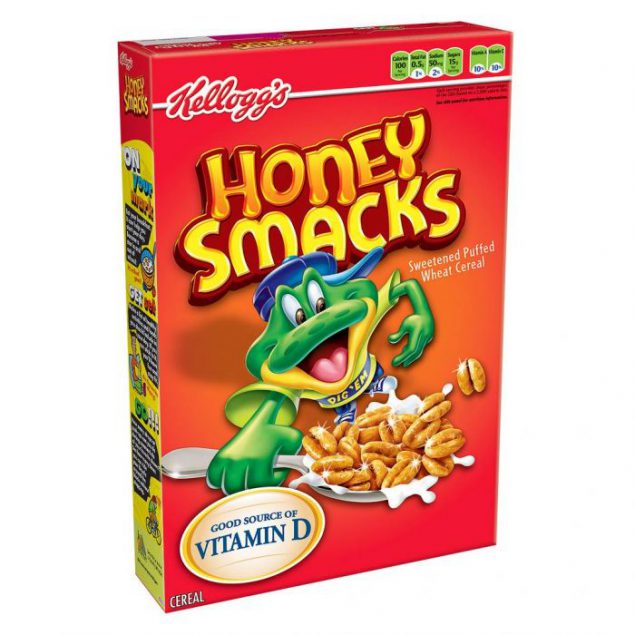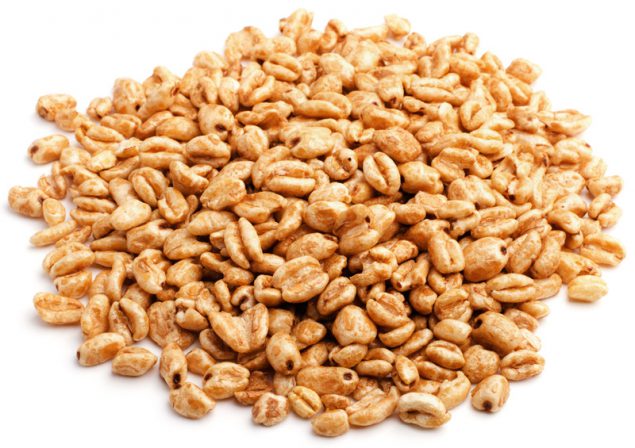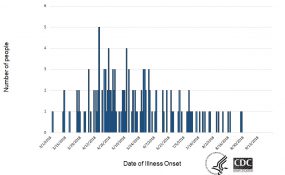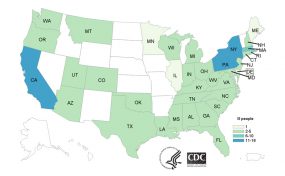2018 Salmonella Mbandaka Infections Linked to Kellogg’s Honey Smacks Cereal (Final Update)
Posted September 26, 2018 5:00 PM ET
This outbreak investigation is over. However, recalled Kellogg’s Honey Smacks cereal has a long shelf life and might still be in people’s homes. Consumers unaware of the recall could continue to eat these products and potentially get sick. Read the Recall and Advice to Consumers and Retailers.
Important advice for consumers and retailers:
- On June 14, 2018, the Kellogg Company recalled Honey Smacks cereal.
- Do not eat recalled Kellogg’s Honey Smacks cereal. Check your home for it and throw it away, or return it to the place of purchase for a refund. Retailers should not sell or serve recalled Kellogg’s Honey Smacks cereal.
- Do not eat Kellogg’s Honey Smacks cereal with a “best if used by” date of June 14, 2019 or earlier. The “best if used by” date is on the box top.
- Even if some of the cereal has been eaten and no one got sick, throw the rest of it away or return it for a refund.
- If you stored cereal that looks like Kellogg’s Honey Smacks in a container without the packaging and don’t remember the brand or type, throw it away. Kellogg’s Honey Smacks is a sweetened puffed wheat cereal.
- Thoroughly wash the container with warm, soapy water before using it again to remove harmful germs that could contaminate other food.
Investigation details:
- As of September 26, 2018, this outbreak investigation is over.
- CDC, public health and regulatory officials in several states, and the U.S. Food and Drug Administration investigated a multistate outbreak of Salmonella Mbandaka infections.
- 135 people infected with the outbreak strain were reported from 36 states.
- 34 people were hospitalized. No deaths were reported.
Epidemiologic and laboratory evidence indicated that Kellogg’s Honey Smacks cereal was the likely source of this multistate outbreak.
Introduction
CDC, public health and regulatory officials in several states, and the U.S. Food and Drug Administration investigated a multistate outbreak of Salmonella Mbandaka infections.
Public health investigators used the PulseNet system to identify illnesses that were part of this outbreak. PulseNet is the national subtyping network of public health and food regulatory agency laboratories coordinated by CDC. DNA fingerprinting is performed on Salmonella bacteria isolated from ill people by using techniques called pulsed-field gel electrophoresis (PFGE) and whole genome sequencing (WGS). CDC PulseNet manages a national database of these DNA fingerprints to identify possible outbreaks. WGS gives a more detailed DNA fingerprint than PFGE. WGS performed on bacteria from ill people in this outbreak showed that they were closely related genetically. This means they were more likely to share a common source of infection.
As of September 25, 2018, 135 people infected with the outbreak strain of Salmonella Mbandaka were reported from 36 states. A list of the states and the number of cases in each state can be found on the Case Count Map page.
Illnesses started on dates from March 3, 2018, to August 29, 2018. Ill people ranged in age from less than one year to 95, with a median age of 57. Sixty-nine percent of ill people were female. Out of 101 people with information available, 34 (34%) were hospitalized. No deaths were reported.
WGS analysis did not predict antibiotic resistance in bacteria isolated from 91 ill people and 8 food and environmental samples. Testing of five clinical isolates using standard antibiotic susceptibility testing methods by CDC’s National Antimicrobial Resistance Monitoring System (NARMS) laboratory also did not show antibiotic resistance.
Investigation Update
Epidemiologic and laboratory evidence indicated that Kellogg’s Honey Smacks cereal was the likely source of this multistate outbreak.
In interviews, ill people answered questions about the foods they ate and other exposures in the week before they became ill. Sixty-three (75%) of 84 people interviewed reported eating Kellogg’s Honey Smacks cereal. Ill people in this outbreak reported this cereal more often than any other cereals or food items.
Health officials in several states collected Kellogg’s Honey Smacks cereal from retail locations and ill people’s homes for testing. Laboratory testing identified the outbreak strain of Salmonella Mbandaka in a sample of unopened Kellogg’s Honey Smacks cereal collected from a retail location in California. Laboratory testing also identified the outbreak strain in samples of leftover Kellogg’s Honey Smacks cereal collected from the homes of ill people in Montana, New York, and Utah. WGS showed that Salmonella bacteria isolated from sick people and the cereal were closely related genetically. This result provides more evidence that people in this outbreak got sick from eating Kellogg’s Honey Smacks.
On June 14, 2018, the Kellogg Company recalled all Honey Smacks cereal that were on the market within the cereal’s one-year shelf-life.
As of September 26, 2018, this outbreak investigation is over.



